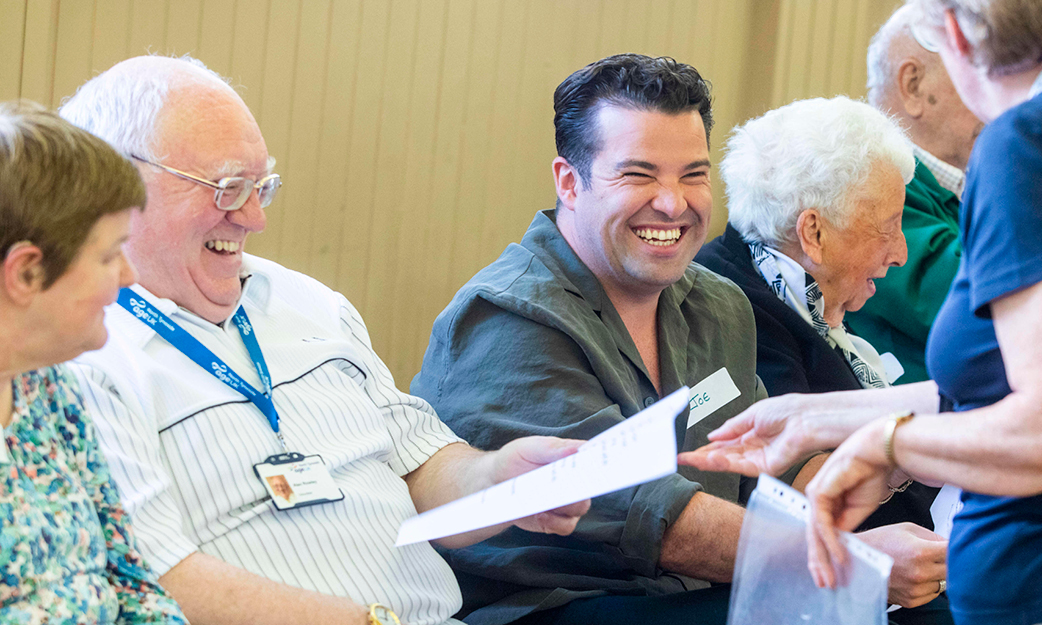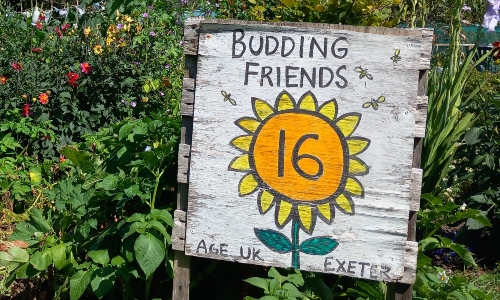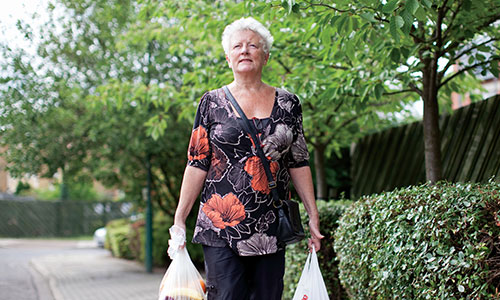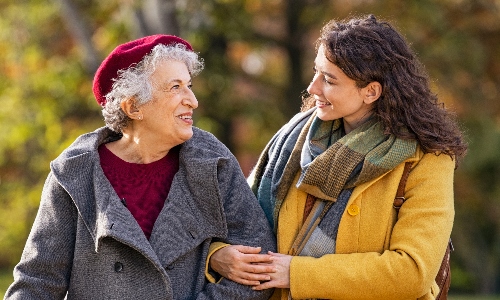In recent weeks, members of the Age UK Information and Advice team have been visiting groups in our Maintenance Cognitive Stimulation Therapy (MCST) programme, which is being delivered by local Age UKs across the country – from Orkney to Somerset.
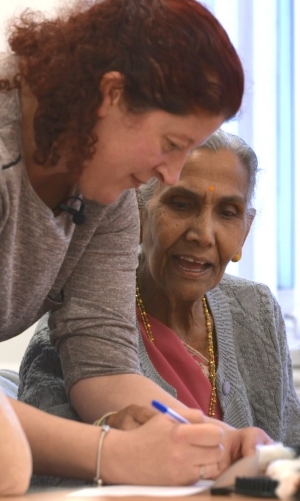
Offering weekly activity sessions for people living with mild to moderate dementia, the MCST groups not only deliver exercises to help maintain memory, but also provide a fun, supportive environment where people can build new friendships.
To showcase the impact of the programme, Age UK is producing a series of videos capturing these activity sessions, and myself and my colleague Tim recently visited the MCST group at Age UK Tameside to film theirs.
Like other groups, Age UK Tameside’s sessions support people living with dementia to work through a range of exercises to help their memory. But this MCST group is going the extra mile, as the sessions are being translated into Gujarati.
Gujarati is the sixth most widely spoken language in India, with approximately 60 million speakers worldwide and more than 200,000 speakers living in the UK. For the eight Gujarati-speaking women who attend Age UK Tameside’s MCST group, having Anamika – a group member’s daughter – volunteer to translate the session’s exercises into their first language means that they can fully access the service and participate in the day’s activities.
Important considerations
When visiting to create video content, it’s vital to minimise the impact you have on the environment you’re trying to capture, to ensure it’s as authentic as possible. But as this was a service for people living with dementia, there were other things we had to bear in mind. Not only were we especially conscious of making sure we didn’t detract from the value of the session; we also didn’t want to create any confusion or unsettle anyone in the group with our presence. This meant taking steps before and during filming to make sure everyone felt as comfortable as possible with the process.
Ahead of our visit, we sent Age UK Tameside a document of our names and pictures so the group could see who was going to be visiting and feel more at ease with us. It also meant attendees could have printed copies on the day, to help put names to faces.
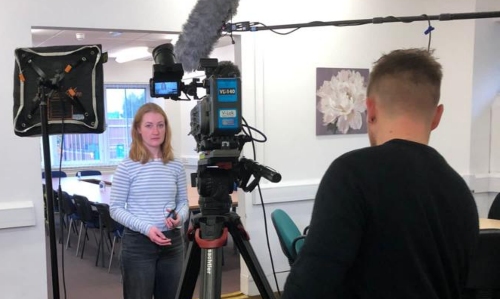
It was also important to consider the impact of our physical presence in the session, so we took steps to minimise how much space the filming equipment took up. This meant bringing a streamlined team of one camera operator with a tripod and a handheld camera so he could move about freely without too much disruption.
We did, however, decide to use an overhead microphone during the interviews as opposed to small discrete clip-on microphones. While the overhead microphone had more of a presence in the room, it avoided us having to enter the ladies’ personal space to clip the microphones onto their clothing, which might take away from the relaxed and comfortable environment we hoped to create.
A warm welcome
Once the equipment was set up and ready to go, the group started pouring into the room with smiley greetings and beautiful saris. Anamika introduced us to the ladies as Eveben and Timbhai – explaining to us that these endings were added to names as a mark of respect – and immediately made us feel very welcomed by the group.
After the group had worked through some of the session’s exercises, we had a chance to speak to Anamika about her role. “I came because my mum comes… but I found there was a need for interpreting because lots of people did not understand much English. So I volunteered to translate,” Anamika explains.
The sessions use a mix of activities – often ones that prompt group members to reminisce about their childhood and recall stories from their past. Having the sessions translated removes the language barriers and means that the women are able to discuss their lived experiences freely.
“We ask them to talk about their childhood and where they come from,” Anamika tells us, “Most come from India or Kenya, East Africa. And they will come out with all these things about how they used to live their lives there.”
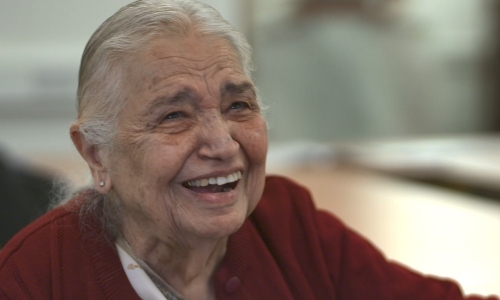
As part of the filming, we also spoke to Anamika’s mum, Savita, about what the group meant to her. “I’m learning different things and meeting different people and socialising,” she tells us. “It’s nice to talk to like-minded people.”
Although we had planned to interview Savita in English, with Anamika translating, it quickly became clear that having Anamika ask her mother the questions in Gujarati would not only help Savita feel as comfortable as possible, but would also encourage more natural responses. During the interview, Savita was completely relaxed in front of the camera – laughing and making jokes between takes. We managed to capture this on film, and her bright laughter is one of my favourite parts of the final video.
Once the session was finished, the group sat down around the table to eat together – as they do each week. But Anamika explained to us that this week was special as it was Diwali soon. She’d brought in some snacks to celebrate, which we were invited to share with the group. They were delicious – so much so that we even picked up some more from a local shop for the journey home.
At such an important time for Gujarati people, the Age UK Tameside MCST group had given the eight women attending an opportunity to come together. It was a privilege to share that moment.
The impact
The video created from our visit has been used by Age UK and Age UK Tameside to promote the programme online and across social media. But it was also shown at this year’s Alzheimer's Show – an industry-leading event for people living with dementia and the families and professionals involved in their care. The footage of the MCST session helped to bring the programme to life, and it was a joyful interlude that highlighted that it’s more than possible to still enjoy life and live well with dementia.
Dementia services like MCST are carefully structured, thought-through and based on science – but my experience of filming with Age UK Tameside has shown me that they’re also fun and relaxed. The laughter and chatter that serve as a soundtrack to the video are just a taster of the happiness that existed in the room, and I hope that the video will continue to highlight the importance of services like these for those living with dementia and their families.
Joining an MCST group
The Age UK network plans to host 180 MCST groups across the country by the end of 2023, as well as virtual MCST sessions.


